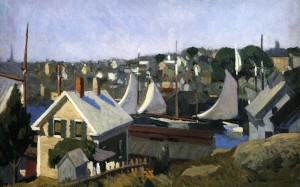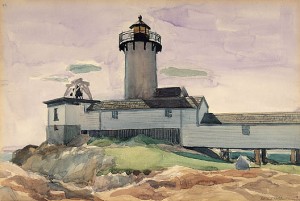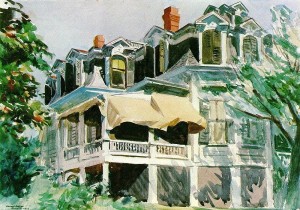 Mrs. T and I recently spent two tranquil days in Gloucester, the Massachusetts harbor town where Edward Hopper spent a fair amount of time in the Twenties and several of whose houses he famously painted. We asked the obliging woman at the front desk of our pretty seaside inn if there were any Hopper paintings or tours to be seen or taken in Gloucester. She looked at us with endearing blankness, as if we’d inquired about Le Nozze di Figaro, or quantum theory.
Mrs. T and I recently spent two tranquil days in Gloucester, the Massachusetts harbor town where Edward Hopper spent a fair amount of time in the Twenties and several of whose houses he famously painted. We asked the obliging woman at the front desk of our pretty seaside inn if there were any Hopper paintings or tours to be seen or taken in Gloucester. She looked at us with endearing blankness, as if we’d inquired about Le Nozze di Figaro, or quantum theory.
This encounter reminded me yet again of how insignificant a role the fine arts play in the lives of most people, and how little that matters in the greater scheme of things. Having grown up in a small town in the middle of America, I ought to know better than to think otherwise, but a quarter-century of continuous residence in Manhattan has inevitably blunted my sense of what matters most to the average American. Hint: it isn’t art.
 Alas, aesthetes also have a way of forgetting that taste and virtue are not the same thing. To be sure, the poet-philosopher Friedrich Schiller, whose “Ode to Joy” was set to music by Beethoven as the finale of his Ninth Symphony, believed that “taste develops in the mind a fitness for virtue, because it suppresses the inclinations which impede, and rouses those which are favorable to virtue.” But I don’t know that I agree with him. In fact, I think that in America, something not unlike the opposite holds true, if only because the fact that our artists and intellectuals tend not to get much respect (or make much money) has a way of breeding ressentiment, the nastiest and most self-destructive of all emotions.
Alas, aesthetes also have a way of forgetting that taste and virtue are not the same thing. To be sure, the poet-philosopher Friedrich Schiller, whose “Ode to Joy” was set to music by Beethoven as the finale of his Ninth Symphony, believed that “taste develops in the mind a fitness for virtue, because it suppresses the inclinations which impede, and rouses those which are favorable to virtue.” But I don’t know that I agree with him. In fact, I think that in America, something not unlike the opposite holds true, if only because the fact that our artists and intellectuals tend not to get much respect (or make much money) has a way of breeding ressentiment, the nastiest and most self-destructive of all emotions.
As I observed in this space back in 2005, I live in
the genteel obscurity of a middle-to-highbrow critic who can count his network TV appearances on some of the fingers of one hand. I realized long ago that in America, there’s no such thing as a famous writer, only famous actors. My all-time favorite joke is about the, er, Polish starlet who, er, slept with the screenwriter. If I ever write a book about Hollywood, which isn’t likely, that’ll be the title: She Screwed the Writer. (Or something close to that, anyway.)
 Do I wish I were rich and famous? Sometimes—though much less often than you’d think. But do I think I deserve to be rich and famous? Not even slightly. All things being equal, I do wish that everybody in America knew who Edward Hopper was, and that our public schools introduced their students to the greatest masterpieces of American art. But I don’t think it would necessarily make them better human beings to know who painted “The Mansard Roof,” or to be able to hum a few bars of the Copland Violin Sonata. At the risk of falling afoul of Godwin’s Law, I think it’s worth pointing out that the most vicious mass murderer of the twentieth century initially aspired to be a professional artist and took a serious and lasting interest in opera.
Do I wish I were rich and famous? Sometimes—though much less often than you’d think. But do I think I deserve to be rich and famous? Not even slightly. All things being equal, I do wish that everybody in America knew who Edward Hopper was, and that our public schools introduced their students to the greatest masterpieces of American art. But I don’t think it would necessarily make them better human beings to know who painted “The Mansard Roof,” or to be able to hum a few bars of the Copland Violin Sonata. At the risk of falling afoul of Godwin’s Law, I think it’s worth pointing out that the most vicious mass murderer of the twentieth century initially aspired to be a professional artist and took a serious and lasting interest in opera.
If I can be forgiven for quoting myself again, “Daily megadoses of beauty won’t make you a better person unless you were a good person to begin with.” Happier? Maybe. Better? No.
* * *
To hear Edward Hopper talking about “The Mansard Roof,” go here.
Louis Kaufman plays the first movement of Aaron Copland’s Violin Sonata, accompanied by the composer:


